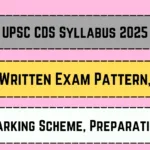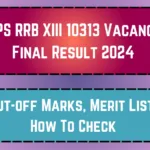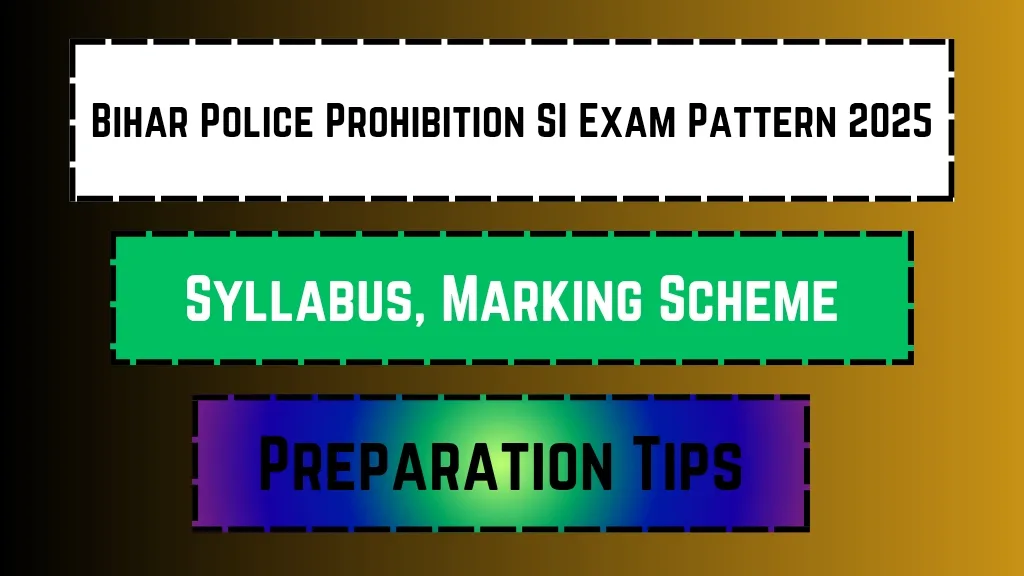The UPSC IAS exam is one of the toughest competitive exams in India, with lakhs of aspirants competing for a handful of seats. If you’re preparing for the 2025 UPSC Civil Services Exam, understanding the exam pattern is crucial. The selection process includes three stages: Prelims, Mains, and Interview. Each stage tests different skills—from general awareness to analytical thinking and personality assessment. Let’s break it down in simple terms, with real-life insights from toppers, expert advice, and the latest updates for 2025.
Key Highlights 🚀
| Aspect | Details |
|---|---|
| Organization Name | UPSC (Union Public Service Commission) |
| Exam Stages | Prelims, Mains, Interview |
| Prelims Papers | 2 (GS & CSAT) |
| Mains Papers | 9 (7 counted for merit) |
| Interview (Personality Test) | 275 marks |
| Total Marks | 2025 (Prelims: 400, Mains: 1750, Interview: 275) |
| Negative Marking | Yes (1/3rd in Prelims) |
| Attempts Allowed | 6 (General), 9 (OBC), Unlimited (SC/ST) |
| Official Website | upsc.gov.in |
UPSC IAS Exam Stages Explained 🎯
1. UPSC Prelims Exam Pattern (Objective Type)
The Prelims is a screening test—only qualifying in nature. Marks don’t count in the final ranking, but you must clear the cutoff.
Paper 1: General Studies (GS)
- Marks: 200
- Questions: 100
- Duration: 2 hours
- Topics: History, Polity, Economy, Environment, Science, Current Affairs
Paper 2: CSAT (Qualifying)
- Marks: 200
- Questions: 80
- Duration: 2 hours
- Qualifying Marks: 33% (66/200)
💡 Pro Tip: Many aspirants ignore CSAT and regret it later. Don’t make that mistake!
2. UPSC Mains Exam Pattern (Descriptive Type)
Only Prelims-qualified candidates appear for Mains. It’s a written exam with 9 papers, but only 7 count for ranking.
| Paper | Subject | Marks | Duration |
|---|---|---|---|
| Paper A | Indian Language (Qualifying) | 300 | 3 hrs |
| Paper B | English (Qualifying) | 300 | 3 hrs |
| Paper 1 | Essay | 250 | 3 hrs |
| Paper 2 | GS-I (History, Society) | 250 | 3 hrs |
| Paper 3 | GS-II (Polity, Governance) | 250 | 3 hrs |
| Paper 4 | GS-III (Economy, Tech) | 250 | 3 hrs |
| Paper 5 | GS-IV (Ethics) | 250 | 3 hrs |
| Paper 6 | Optional Subject – Paper 1 | 250 | 3 hrs |
| Paper 7 | Optional Subject – Paper 2 | 250 | 3 hrs |
📌 Did You Know?
- Optional subject choice can make or break your rank. Popular choices: Public Administration, Sociology, Geography.
- Essay paper is often underestimated—top scorers like Ira Singhal (AIR 1, 2015) credit their success to a well-structured essay.
3. UPSC Interview (Personality Test)
The final hurdle! The interview assesses your personality, leadership, and communication skills.
| Aspect | Details |
|---|---|
| Marks | 275 (added to Mains score) |
| Duration | 30-40 mins |
| Panel | 5-6 experts |
| Focus Areas | Current affairs, DAF (Detailed Application Form), situational questions |
🎤 Expert Insight:
“The interview isn’t about right or wrong answers—it’s about clarity of thought.”
— Dr. Tanu Jain (IAS Mentor, Founder of Tathastu ICS)
UPSC IAS Marking Scheme & Cutoffs 📊
Final Merit Calculation
| Stage | Marks |
|---|---|
| Mains (7 Papers) | 1750 |
| Interview | 275 |
| Total | 2025 |
Previous Year Cutoffs (Final Rank)
| Year | General | OBC | SC | ST |
|---|---|---|---|---|
| 2023 | 953 | 915 | 890 | 880 |
| 2022 | 960 | 925 | 900 | 880 |
| 2021 | 953 | 910 | 886 | 883 |
📌 Reality Check: The competition is fierce—just 0.2% of applicants make it to the final list.
How to Crack UPSC IAS 2025? 🏆
1. Smart Study Plan
- Prelims Focus: NCERTs + Current Affairs (The Hindu, PIB)
- Mains Strategy: Answer writing practice (minimum 2 essays/week)
- Optional Subject: Pick wisely—balance interest & scoring potential
2. Time Management
| Task | Daily Hours |
|---|---|
| Newspaper Reading | 1-1.5 hrs |
| GS Preparation | 4-5 hrs |
| Optional Subject | 2-3 hrs |
| Revision | 1 hr |
3. Common Mistakes to Avoid ❌
- Ignoring CSAT preparation
- Over-reliance on coaching notes (NCERTs are gold)
- Not practicing answer writing
💬 Real-Life Example:
Shubham Kumar (AIR 1, 2020) followed a disciplined 8-hour study routine and focused heavily on revision in the last 3 months.
Final Thoughts
The UPSC IAS exam pattern is designed to test knowledge, analytical skills, and personality. With the right strategy—consistent preparation, smart time management, and self-assessment—you can crack it. Stay updated with 2025 changes, follow topper strategies, and keep pushing forward! 🚀
Aarav Singh is a content strategist focusing on recruitment notifications and exam updates. He holds a degree in Economics and has 6+ years of experience. Aarav loves analyzing job market trends and playing cricket.







